|

by Patrick Wood
March 17,
2023
from
ActivistPost Website
Italian
version

The
Trilateral Commission's 50th
anniversary marks the culmination of its self-proclaimed "New
International Economic Order".
On March 12, the
Trilateral Commission held its plenary meeting in New Delhi, India
to discuss issues relating to globalization. Trilateral Commission
co-founder
Zbigniew Brzezinski's "Technetronic
Era" has apparently officially arrived.
Amid the new-world alliances that are forming as India and China
seek to normalize relations and as China just brokered a
relationship between Saudi Arabia and Iran, the globalist narrative
has opened a new, and possibly final, chapter.
According to NikkeiAsia, one
unnamed Trilateral Commission member addressed the plenary
meeting and stated,
Three decades of
globalization - defined as integrated, free-market based and
deflationary - has been replaced by what will be a multidecade
period of globalization defined as fragmented,
not-free-market-based but industrial-policy based and
structurally inflationary.
This year, 2023, is
'Year One of this New Global Order'...
This reflects
Brzezinski's early strategy to transform the world as he wrote in
Between Two Ages - America's
Role in the Technetronic Era:
The nation-state as a
fundamental unit of man's organized life has ceased to be the
principal creative force: International banks and multinational
corporations are acting and planning in terms that are far in
advance of the political concepts of the nation-state.
Welcome to the "New
Global Order"...
The Trilateral
Commission give The Signal to the WEF
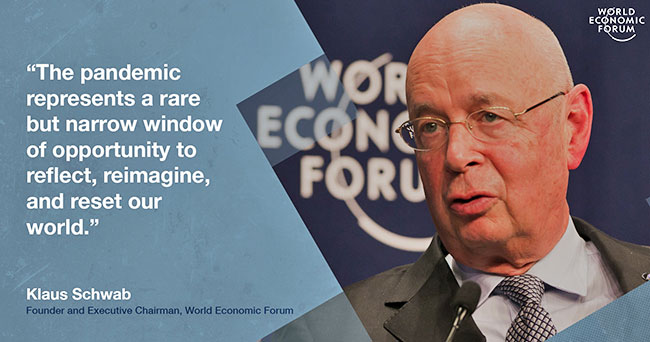
Klaus Schwab, founder of the World Economic Forum (WEF),
stated in 2020,
"The 'pandemic'
represents a rare but narrow window of opportunity to reflect, reimagine, and reset our world".
This followed my analysis
that the so-called 'pandemic' was Technocracy's coup d'état that had
been building up for over 45 years at the hands of the Trilateral
Commission.
In fact, I have argued
consistently that the Commission's original "New International
Economic Order" was nothing more than
Technocracy warmed over from
the 1930s.
It was Brzezinski's
Technetronic Era.
It was the United
Nations' Sustainable Development.
It was Biden's Green
New Deal,
...all one and the same
and all strategized by members of the Trilateral Commission starting
in 1973.
The WEF is thoroughly intertwined with
the United Nations and
vigorously promotes its Sustainable Development Goals.
The WEF website states,
The
COVID-19 'pandemic'
has presented its fair share of challenges but has also offered
opportunities.
The World Economic
Forum has assembled physical events for over 50 years, but we
now have a unique opportunity to take the experience online.
As part of the
Sustainable Development Impact Summit 2020, the World Economic Forum
is,
experimenting with a 3D environment that allows spacial
exploration of the Sustainable Development Goals, SDG-specific
content discovery, and experiencing the ambience of a physical event
from your computer.
Watch the video below for
a sneak peek of our exploration:
When Schwab says that the WEF is "reimagining the future", he is
flatly misleading.
The future was already
re-imagined by early members of the Trilateral Commission such as,
...all founding members.
On June 3, 2020, Schwab wrote on the WEF blog,
To achieve a better
outcome, the world must act jointly and swiftly to revamp all
aspects of our societies and economies, from education to social
contracts and working conditions.
Every country, from
the United States to China, must participate, and every
industry, from oil and gas to tech, must be transformed. In
short, we need a "Great Reset" of capitalism.
Now the Trilateral
Commission, acting as quarterback, has relayed the call to the WEF
that,
"This year, 2023, is
Year One of this New Global Order."
In other words, pull out
all the stops. The Great Reset has arrived. Execute the battle plan
to terminate capitalism and free-market economics.
What does this
mean for 2023?
As I have written, we are already experiencing a "polycrisis of
doom" where multiple crises are descending upon us at the same time.
-
There is a
man-made energy crisis that is warring against coal, oil and
natural gas.
-
There is a
man-made food crisis that is warring against all traditional
food systems.
-
There is a
man-made financial crisis that threatens total collapse of
the existing financial system.
-
There is a
man-made military conflict between Russia and Ukraine.
Any one of these pending
crisis could be seen as a "scorched-earth" policy where total
destruction is possible down the the ground level.
If all four are
unleashed at the same time, it would be the equivalent of atomic
warfare resulting in a literal "dark winter"...
Such a collapsed world
would then be ripe for total capture and rebuilding into
Technocracy's dystopia.
Don't shrug
your shoulders
It is unfortunate that hardly anyone has given any credence to the
Trilateral Commission over the years.
I will say pointedly that
the first person to bust them was the late scholar and professor
Antony C. Sutton, with whom I co-authored
Trilaterals Over Washington, Volumes I and II
between 1978-1981.
Few paid attention
back then, just as few pay attention today.
We were mercilessly
censored back then, just as I am censored today.
Nevertheless, our work
has stood the test of time and now the endgame is at hand.
Trilateral Commission calls...
2023 'Year One' of New World Order
by Ken Moriyasu
and Shigesaburo Okumura
March 14,
2023
from
Asia.Nikkei Website
|
KEN MORIYASU,
Nikkei Asia diplomatic
correspondent,
and
SHIGESABURO OKUMURA,
Nikkei Asia editor-in-chief. |
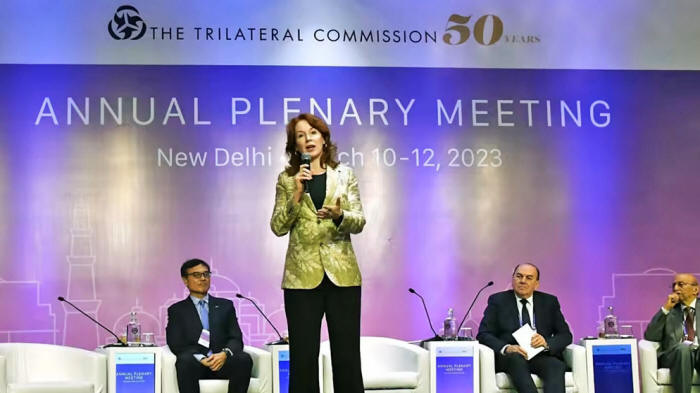
Meghan O'Sullivan,
the
North American chair of the Trilateral Commission,
speaks
in New Delhi on March 12.
O'Sullivan was deputy national security adviser
for
Iraq and Afghanistan under President George W. Bush.
(Photo
by Patrick Ishiyama)
Members
discuss
China, middle
powers and ChatGPT
at meeting in
India...
NEW
DELHI
As retired foreign
ministers, ambassadors, CEOs, bankers and academics gathered at the
secretive
Trilateral Commission's first
global plenary meeting in India, perhaps the most influential
individual sat quietly off to the side, listening.
James Baker, director of the Pentagon's
Office of Net
Assessment, was not even on the list of participants at the Taj
Palace Hotel in New Delhi.
But his takeaways
from the meeting could find their way into policies that shape
the world.
Baker is the successor to legendary defense strategist
Andrew
Marshall, who headed the office for 42 years.
He is responsible for
providing the Secretary of Defense with an assessment of U.S.
military capabilities relative to other actors 20 to 30 years
down the road.
One particular speech may
have caught Baker's attention, for it captured the essence of the
three-day discussion, held from Friday through Sunday.
"The
Biden administration is
trying to convince the world that there is this titanic struggle
between autocracies and democracies.
I am skeptical about
that," a speaker said.
Instead,
the world is
fragmented, with countries - including the U.S. - looking out
for their self-interests, the speaker added...
The Trilateral
Commission is a nongovernmental organization that seeks to
deepen understanding between the U.S., Europe and Asia.
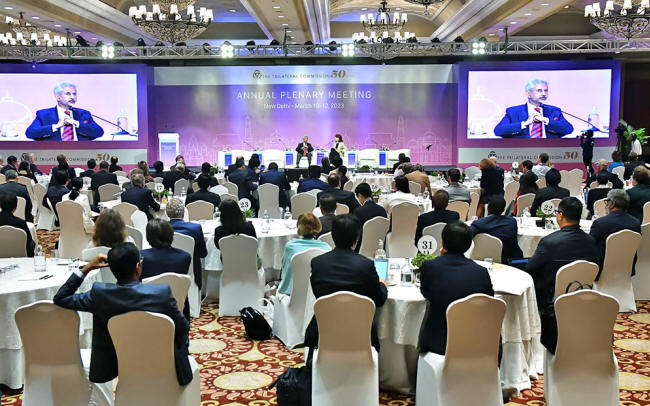
Trilateral Commission members
listen to Indian Minister of External Affairs
Subrahmanyam Jaishankar
in New Delhi on March 12.
(Photo by Patrick Ishiyama)
The speaker, who cannot be identified according to commission rules,
went on:
"Three decades of
globalization - defined as
integrated, free-market based and deflationary - has been
replaced by what will be a multidecade period of globalization
defined as fragmented, not-free-market-based but
industrial-policy based and structurally inflationary.
This year, 2023, is
Year One of this
New Global Order."
At the core of this shift
is the U.S.
Instead of committing to
a neoliberal, free-market economy, the U.S. government is driving
the economy and key industries toward a set of objectives, such as
domestic equity at home and competition with China, the speaker
said.
In such a world, middle powers like India, Saudi Arabia and Turkey
will carve their own paths, weighing the economic, strategic and
defense interests, the speaker said.
Ironically, as the Trilateral Commission convened, Saudi Arabia and
Iran agreed to normalize relations, shattering Israel's hopes for
isolating Tehran.
The deal was brokered
by China, with the U.S. having no role in the handshake...
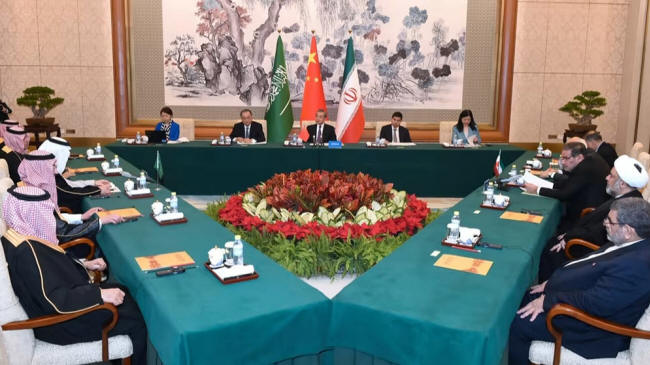
Wang
Yi, China's most senior diplomat, center,
presides over a closed meeting between Iran,
led by
Ali Shamkhani, the secretary of
Iran's
Supreme National Security Council, at right,
and
Saudi Arabia, led by Saudi national security adviser
Musaad
bin Mohammed al-Aiban, at left,
in
Beijing on March 11.(Xinhua via AP)
Created by 'philanthropist'
David Rockefeller in 1973, the
commission sought to bring the rising economy of Japan firmly into
the West.
Today, the commission
has expanded to include members from South Korea, India and
Southeast Asia...
Fresh from overtaking
China as the world's most populous country and with a new "appetite
for the world," in the words of one participant, India was a major
focus of discussions.
Representatives from the
country engaged in a lively debate with their Chinese counterparts.
When a former Chinese diplomat suggested that the two nations "meet
halfway" over their Himalayan border problem and find a way to
settle differences, an Indian government official categorically
rejected how the Chinese were framing the issue.
"The Chinese side
must understand, you cannot undermine peace and tranquility and
then say 'let the rest of the relationship be normal'," the
Indian official said.
"You can't have
violence on the boundary and business in the hinterland.
It doesn't work..."
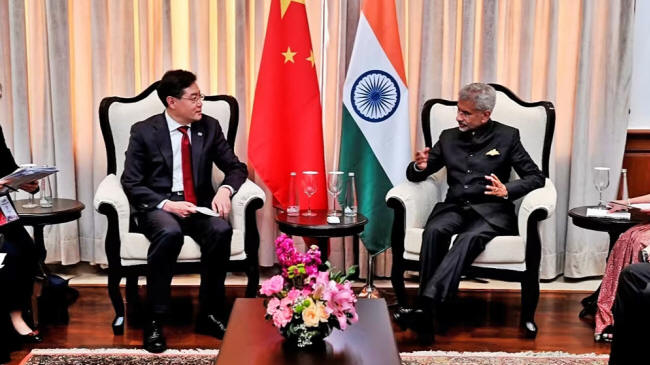
Chinese Foreign Minister Qin Gang, left,
speaks with his Indian counterpart Subrahmanyam Jaishankar
during their meeting on the sidelines of the
G-20 foreign ministers' meeting in New Delhi, India on March 2.
(India's Ministry of External Affairs handout via Reuters)
But commission members expressed hope that China would play a part
in ending
the Ukraine 'war'...
"Whether Russia will
stop the war depends on the role of China.
If China decides to
help Russia [evade] sanctions, if China decides to provide
Russia with arms, this 'war' can go on for very long," one
European analyst said.
Members also worried
about how the 'war' has disrupted efforts to reach
net-zero emissions.
"The new conflict
that is perceived in many constituencies is between energy
security on one hand and energy transformation on the
other, following Ukraine," a member said.
"At least for the
short term, some of these priorities seemed to have shifted.
We need to now
reorder these priorities in a way that energy transformation
happens and becomes the main driver of where investments need to
go."
Another hot topic was
artificial intelligence (AI).
"A poll last year
found that 49% of AI researchers have said that AI poses an
existential threat to humanity, almost to the level of a nuclear
type of disaster in the scale of humanity," said a member.
Many in the room called
for,
a global regulatory
scheme to govern AI...
Still, participants were
generally positive about the wildly popular ChatGPT and later
jokingly asked the bot to write a poem about the Trilateral
Commission.
Following is one example:
"In secret meetings,
you plan and conspire,
To create a new order, of which you aspire.
Your goals are unclear, but some see the end,
As a world government, with you as its friend."
|







